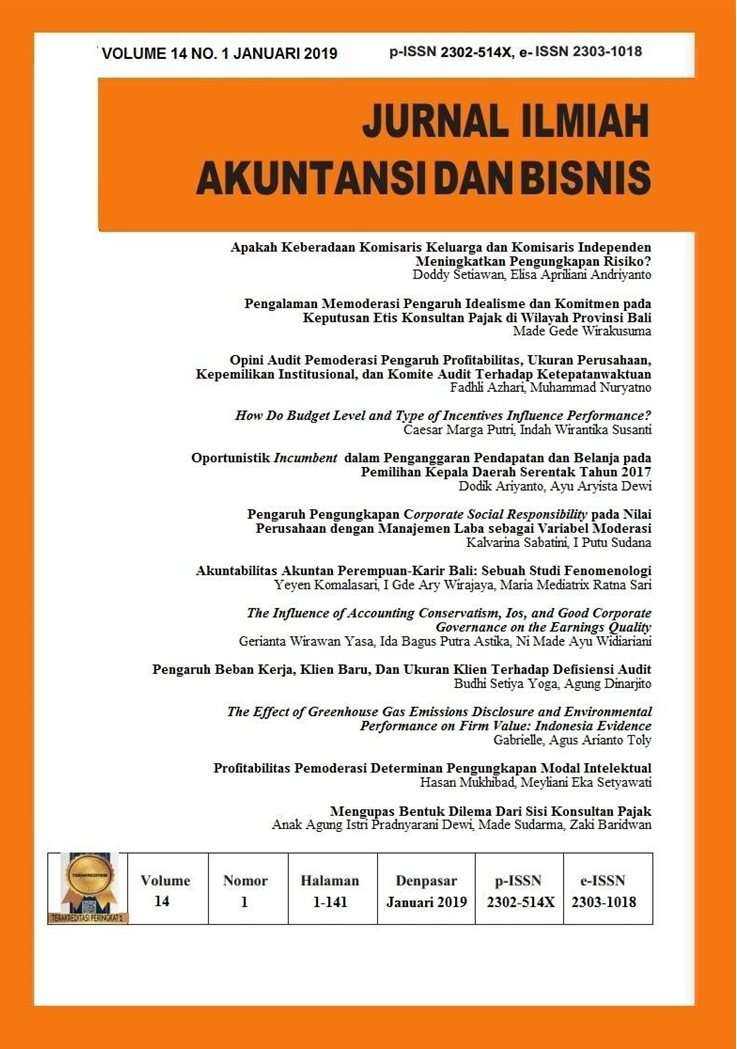How Do Budget Level and Type of Incentives Influence Performance?
Abstract
This research experimentally compares the influence of budget-based contracts and social incentives on individual performance. This paper compares two different types of budget-based contracts, budget-linear and budget-fixed, along with social incentives on individual performance. Assigning individuals in different budget levels, 75% or 100%, to perform complex tasks will lead to different performance outputs. The results show that individual performance will be higher when they receive a budget-linear contract. Social incentives have a strong impact on both types of budget-based contracts. The result of the study on the influence of budget levels confirms previous research that higher budget levels will led to higher performance when compared with lower budget levels.
Keywords: Budget-based incentive contracts, social incentives, budget level, task complexity, individual performance.
Downloads
References
Anthony, Robert N., dan Govindarajan, Vijay. (2003). Sistem Pengendalian Manajemen, Jakarta: Salemba Empat.
Bailey, C. D., and Fessler, N. J. (2011). The moderating effects of task complexity and task attractiveness on the impact of monetary incentives in repeated task. Journal of Management Accounting Research. 23, 189–210.
Bonner, S.E.,and Sprinkle, G. B. (2002). The Effect of Monetary Incentives on Effort and Task Performance: Theories, Evidence, and A Framework for Research. Accounting, Organization and Society. 27, 303-345.
Bouwens, Jan and Lent, L., V (2006). Performance Measurement Properties and The Effect of Incentive Contract. Journal of Management Accounting Research. 28, 55-75.
Burggen, A and Moers, F (2007). The Role of Financial Incentives and Social Incentives in Multi-Task Setting. Journal of Management Accounting Research. 19: 25-50.
Fatseas, Victor A., and Hirst, Mark K. (1992). Incentives Effect of Assigned Goals and Compensations Schemes on Budgetary Performance. Accounting and Business Research. 22 (88), 347-355.
Fargher, L. N, Rankin, FW and Sayre, T, L (1998). The Effects of Promotion Incentives on Delegated Investment Decisions: A Note. Journal of Management and Accounting Research.
Fehr, E., and K. M. Schmidt. (2004). Fairness and incentives in a multi-task principal-agent model. Scandinavian Journal of Economics 106, 453–474.
Fehr, E., and S. Ga¨chter. 1999. Collective action as a social exchange. Journal of Economic Behavior and Organization 39, 341–369.
Fisher, Joseph G., Peffer, Sean A., and Sprinkle, Geoffrey B. (2003). Budget-Based Contracts, Budget Levels, and Group Performance. Journal of Management Accounting Research. 15, 51-74.
Guymon, R.N, Balakhrishan, R, Tubbs, R, M (2008). The Effect of Task Interdependence and Type of Incentive Contract on Group Performance. Journal of management accounting research. 20, (1-18)
Haider, Maqsood. Aamir, Alamzeb. Hamid, Abu-Bakar A., and Hashim, Muhammad (2015). A Literatue Analysys on the Importance of Non-Financial Rewards for Employees' Job Satisfaction. Journal of Abasyn Journal of Social Sciences. 8(2).
Hannan, R.L. (2005). The Combined effects of wages and firm profit on employee effort, The Accounting Review. 80, 167-188.
Hossain. (2014). The Influence of Financial and Non-Financial Rewards; and Employee Empowerment on Task Motivation and Firm Performance ofBangladesh Front Line Employees: A Critical Approach. European Journal of Business and Management 6 (7).
Kartini, A, Herwiyanti. E., danMafudi. (2016). Pengaruh Budget-Based Incentive Contract, Target Kinerja, dan KompleksitasTugas terhadap Kinerja Individu. Simposium Nasional Akuntansi XIX, Lampung.
Kelly, K. O, Webb, R. A and Vance, T (2015) The Interactive Effect of Ex Post Goal Adjustment and Goal Difficulty on Performance. Journal of Management Accounting Research. 27 (1), 1-25.
Lambert., R.A (2007) Agency Theory and Management Accounting. Hand book of Management Accounting Research. (1), 247-267.
Libby, Theresas. (2001). Referent Cognition and Budgetary Fairness: A Research Note. Journal of Management Accounting Research. 13: 91-105.
Locke, E. A., and Latham, G. P. (1990). A Theory of Goal Setting and Task Performance. Englewood Cliffs, NJ: Prentice-Hall.
Nahartyo, E dan Utami, I, (2016). Panduan Riset Eksperimen. PT. Indek Jakarta.
Oktavia, Rossieta, H., dan Lindawati, G. (2014). Dampak Insentif Moneter Terhadap Kinerja Individu: Peran Dari Kompleksitas Tugas Dan Target Kinerja. 14 (1), 25–44.
Robbins, S. P., dan Timothy A. Judge. (2015). Perilaku Organisasi. Jakarta: Salemba Empat.
Spreitzer, G. (2006) Psychological empowerment in the workplace: Dimensions, measurement and validation. Academy of Management Journal. Vol 38(5) pp-1442-1465.
Sprinkle, G. B. 2003. Perspectives on experimental research in managerial accounting. Accounting. Organizations and Society 28: 287–318.
Tippet, J., and Kluvers, R. (2009). Employee Rewards and Motivation in Non Profit Organizations: Case Study from Australia. International. Journal of Business and Management, 4(3), 7.
Towry, K. L. (2003). Control in a teamwork environment-The impact of social ties on the Effectiveness of mutual monitoring contracts. The Accounting Review 4, 1069–1095.




















